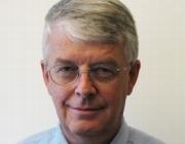
Russian and Soviet government expert Timothy J. Colton delivered a talk on Nov. 4 on leadership in post-Soviet nations. The lecture was titled “Political Leadership after Communism” and sponsored by the Levitt Center Speaker Series. Colton is the Morris and Anna Feldberg Professor of Government and Russian Studies and chair of the Government Department at Harvard University, and the author of numerous books on Russian and Soviet politics.
Colton began his lecture by discussing some of the commonly cited pitfalls with the study of political leadership. Critics of the field often point out the difficulty in parsing general patterns from the study of individual leaders, as well as the complexity of measuring leadership characteristics. They also argue individual leaders are only one piece of a larger arena of political action and therefore should not be studied in isolation. After describing these common critiques of the study of leadership, Colton presented his own typology of leadership, illustrating his theory within the context of post-Soviet governance.
In his lecture, Colton argued political leaders can be ranked according to both their effectiveness and their level of impact. Effectiveness, as Colton defined it, is a leader’s success in achieving his or her stated goals. Impact on the other hand, is the influence of a leader’s action on a national, regional, and global scale. In his lecture, Colton pointed out that some leaders may be highly effective in achieving their goals, but if these goals are modest they may nevertheless have a low overall impact.
After explaining his distinction between effectiveness and impact, Colton illustrated his typology with examples of post-Soviet leadership. He ranked a variety of political leaders as either effective or ineffective, and their impact as low, ambiguous or high.
Current Russian President Vladimir Putin, according to Colton, is an effective leader with a high level of impact. Colton pointed out that Putin has achieved most of his stated goals while in office, improving Russia’s political stability, enhancing economic growth, and putting an end to war with Chechnya, among other accomplishments. He argued the Russian president has not only been effective in achieving these goals, but has had a tremendous impact on the country and the international community.
On the other hand, Colton pointed to former Soviet leader Mikhail Gorbachev as an ineffective leader who had a high level of impact. He argued that while Gorbachev failed to achieve his stated goals, this failure nevertheless led to the collapse of the Soviet Union and had a significant global impact. The example illustrated that indeed “leaders who fail to carry out their directives can be more influential than leaders who achieve modest objectives.”
In addition to Putin and Gorbachev, Colton described the leadership styles of a multitude of post-Soviet leaders. Ilham Aliev of Azerbaijan, Stanislav Shushkevich of Belarus, Dmitry Medvedev of Russian, and Roza Otunbayeva were among those discussed in-depth.
Colton concluded his talk with general observations from his study of post-Soviet leadership. For example, he noted that the majority of leaders who have been both effective and highly impactful are those promoting undemocratic agendas.
He also pointed out that leaders in the region have generally become more successful with time, suggesting that recent leaders may have learned from their predecessors’ mistakes.
Finally, Colton argued that those who peacefully relinquish their powers in favor of democratic institutions might be the leaders that history remembers the most.
Posted November 5, 2013
